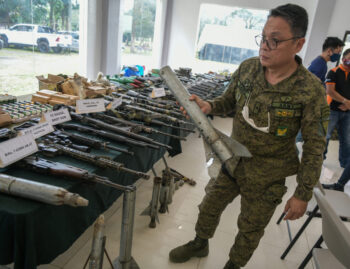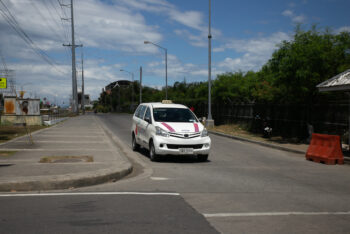
(On the 36th anniversary of People Power that ousted the Marcos dictatorship, let us remember what Mindanawons did to fight for freedom.
This piece by Aquilino Q. Pimentel, Jr. was among the essays featured in the book ‘Turning Rage Into Courage: Mindanao under Martial Law,’ published by MindaNews in 2002, on the 30th anniversary of the declaration of martial law by President Ferdinand Edralin Marcos)
I had been in politics for about a year as an elected Constitutional Convention delegate representing the province of Misamis Oriental when President Ferdinand Marcos placed the country under martial rule on September 21, 1972.
Martial rule was his way of imposing his dictatorial will upon the nation. Until his ouster in the last week of February 1986, the Marcos dictatorship had made life difficult for those who dared to dispute his presumption that authoritarianism was the better principle of governance than democracy.
In my case, the dictator had me arrested four times on various occasions from 1972 to 1985 on trumped-up accusations of rebellion, sedition, illegal assembly, ambuscades, and other alleged offenses against public order.
All told, I was deprived of my liberty for a year. Not too long really if reckoned against the life of the nation but long enough to compel me and my family to abandon plans for a productive life and to live instead from day to day for the duration of martial rule.
Twice, Marcos also ousted me from the public offices to which the people of Cagayan de Oro city had elected me: first as the mayor of the city in 1981 and then later as the assemblyman representing the city at the Batasang Pambansa in 1984.
The incarcerations and ousters from public office reduced my family to near penury.
But thanks to the mercy of the Almighty and the generosity of our people, we managed to survive.
It’s been 30 years now since the end of martial rule. I have no wish to dwell in detail on the sorrow-filled episodes of my detentions in military camps and the run-ins I had with the Marcos dictatorship.
I would rather recall the pleasant memories of how people, most of them worse off than I was in terms material, amazingly kept the spirit of freedom alive in my heart and in theirs in open, active but nonviolent defiance of the dictatorship.
The masses of Cagayan de Oro City, for instance, bravely supported my fight for the freedoms of our people as their mayor and as their representative to the Batasang Pambansa.
When Mr. Marcos had me ousted as mayor for branding the World Bank-NHA (National Housing Authority) housing project in Cagayan de Oro as anti-poor, the people of the city staged what probably was the first People Power demonstration in the country. The demonstration was a subversive act in the context of martial rule but it was peaceful and rather massive by the standards of Cagayan de Oro, a small city at the time.
To my delight, Mr. Marcos, fearing a wider backlash, revoked his order to oust me and in the event desisted from forcing me out of office.
In yet another glorious display of our people’s public, peaceful and spirited resistance to the strictures of martial rule – a sight both eerie and inspiring – thousands of Cagayanons waving lighted candles at the crack of dawn greeted my arrival on board a commercial ship at the city pier from detention in a Cebu military jail to begin my house arrest in my home city. They had stood up to be counted against the specific order of the Philippine Constabulary commanding general of the region banning demonstrations of welcome for me. In the event, neither the military nor the police could do anything to enforce the order.
A few years later, some Marcos minions filed charges against me for allegedly engaging in ambuscades. Again, the people of Cagayan de Oro came to my rescue. With their hard-earned money, market vendors, farmers, fisherfolk, and plain Juan and Juana de la Cruzes produced the 50,000 pesos bail required to keep me out of jail at least temporarily. My friends would mischievously recount to me later how they had enjoyed the sight of the clerks of court getting irritated by their having to count to the last centavo my “cash bond” consisting of stained peso bills and small coins.
Aside from individuals, institutions also abetted my resolve to fight the dictatorship. The Catholic Church in Cagayan de Oro led by the sainted Archbishop Patrick Cronin, a Columban (now deceased) and Fr. Jose Villiamil, the activist parish priest of St. Augustine, backed up the people’s causes that I had espoused during those difficult times.
Certain leaders of the United Church of Christ and the Iglesia Filipina Independiente likewise stood with me in the fight against the dictatorship.
The Jesuit Faculty of Xavier University, the school where I finished my high school and my law degree in Cagayan de Oro, headed by its President, Fr. Ernesto Javier, S.J., also aggressively defended me against the attempts of Mr. Marcos to silence me.
I must also single out three Jesuits, now all deceased, Fr. Francisco Demetrio, Fr. William Masterson, and Fr. William Nicolson, as among my more visible defenders. I must also say that the struggle would have been more difficult had not Fr. Ben Nebres, now president of the Ateneo de Manila University, and Sister Christine Tan eased the financial burden of my having to send a brood of six children to school even as I tilted against the windmills of Mr. Marcos.
Looking back, I can say in all honesty that I could not have lasted – to use a cliche – the lonely days of my unjust incarcerations and the oppressive harassments of the dictatorship had the people of Cagayan de Oro and other intrepid souls not backed me up in the struggle for freedom. It goes without saying, too, that one source of great strength for me in those trying times was my wife, Bing. She had never nagged me about the lack of food at the home table or the lack of creature comforts that I, as a father, was expected to provide our children.
During my detention in the Marcos military jails, Bing was both father and mother
to our children. And thank God, our children, all six of them, even in their youthful innocence, behaved as if they had fully understood why I was often arrested by Marcos’ military apparatus then. I especially thank the Good Lord that our kids did not go wayward. They dutifully stuck to their books and incessantly prayed with their mother for my safety and the deliverance of our people from the bondage of martial rule.
The sufferings that we had to go through as a family through the years of martial rule, I believe, had a beneficial though unintended consequence. The pains and privations inflicted upon us by martial rule contributed immensely to the strengthening of our bonds as a family and to the sharpening of our collective attitude towards public service: that it is a singular chance given to public servants to serve God by serving His people. We also learned that even under the most difficult of circumstances, it is possible for one to deliver on the noble demands of public life.
Indeed, even clouds have their silver lining. In my case, the 14 years of martial rule had one too.
(Nene Pimentel is Senator Aquilino Pimentel)
Updated, 25 February 2022: Senator Nene Pimentel passed away on October 20, 2019.







